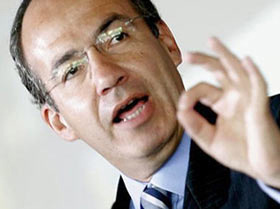 |
 |
 |
 Editorials | June 2007 Editorials | June 2007  
Fiscal Reform in Mexico: What are the Prospects?
 Allan Wall - PVNN Allan Wall - PVNN


| | President Felipe Calderon has sent his long-awaited fiscal reform proposal to the Mexican Congress, and negotiations have begun. |
President Felipe Calderon has sent his long-awaited fiscal reform proposal to the Mexican Congress, and negotiations have begun.

Calderon’s point man is Augustin Carstens, the portly treasury secretary, who put the reform proposal together. It’s Carstens’ job to negotiate the proposal with Congress.

This is not like the old days of the one-party state, when the Congress was a rubber stamp for the executive. Since no party has a majority, Calderon and Carstens will have to negotiate with the opposition parties to make fiscal reform law.

A good fiscal reform is very important for the Mexican economy.

The current Mexican tax system is complicated but ineffective, and it’s been estimated that Mexico has a 40 percent tax evasion rate.

This forces the government to rely upon oil revenues from the state monopoly PEMEX (Mexican Petroleum). Currently about 40 percent of the budget comes from PEMEX.

But this in turn takes funds from PEMEX that could be utilized for oil exploration, exploitation and processing.

In a recent World Bank diagnosis of the Mexican economy, both the tax system and energy sector were noted as needing improvement.

Alan Greenspan, former U.S. fed chief, recently predicted in a teleconference that if Mexico didn’t increase private investment for PEMEX, it was headed for a financial crisis.

Prominent Mexicans, including Jose Angel Gurria, now General Secretary of the OECD (Organization for Economic Cooperation and Development), did not agree, exactly. They don’t agree that the Mexican Constitution must be amended to allow more oil investment. But they do agree that Mexico relies too heavily on oil money for its government budget.

The challenge is to find a way to reform Mexico’s taxation system. That’s easier said than done.

On the one hand, Mexico’s wealthy, including Carlos Slim and the nine other Mexican billionaires, need to pay their fair share.

On the other hand, the goal of fiscal reform should not be to fleece the rich. It should be to establish a fair and equitable, yet business-friendly taxation system that will encourage growth in the Mexican economy.

Many Mexicans don’t understand this. They talk about the “unequal distribution of wealth” without considering the generation of wealth.

There is great inequality between various regions of Mexico. But the solution is not to bring the rich parts of Mexico down to the level of the depressed regions. The solution is to utilize Mexico’s existing wealth to bring prosperity to the poor through generation of employment.

Another Pandora’s box is the vast informal economy, whose participants don’t pay taxes. How will the informal merchants be brought into the formal economy? They aren’t accustomed to paying taxes, so how will the government convince them it’s in their interests?

Another interesting detail of the fiscal proposal is that it would allow Mexican states to add to taxes on gasoline, diesel, beer and tobacco. Although this authority could easily be abused, it could be a step toward greater federalism.

Though Mexico is a nation of great cultural diversity, administratively it is highly centralized. State and municipal governments raise little of their own funds, and mostly depend on handouts from the federal government.

A real federalism would involve states and cities managing more of their own fiscal responsibilities. An advantage would be that Mexican states could, in effect, run their own economic experiments, trying different fiscal strategies to find what works best for their state or municipality.

Politically speaking, the fiscal reform negotiations have just begun, and there are many pitfalls.

Although the PAN (National Action Party) and the PRI (Institutional Revolutionary Party) could get together and pass a fiscal reform without the PRD (Party of the Democratic Revolution), it would be highly advantageous for the fiscal reform to be approved by all three parties.

Imagine, for example, if the PAN and PRI passed it but the PRD didn’t agree. The PRD, with its formidable expertise in staging mass demonstrations, could stir up street merchants to protest the new law, and greatly reduce its effectivity.

On the other hand, if the three parties all have a stake in it, it’s more likely it could be enacted and carried out.

The ideal outcome is that the Calderon administration and the Mexican Congress approve a viable fiscal reform that is fair and enforceable, that will allow PEMEX to operate like a real oil company, and that will generate economic growth for Mexico and its people.
 Allan Wall is an American citizen who has been teaching English in Mexico since 1991, and writing articles about various aspects of Mexico and Mexican society for the past decade. Some of these articles are about Mexico's political scene, history and culture, tourism, and Mexican emigration as viewed from south of the border, which you can read on his website at AllanWall.net. Allan Wall is an American citizen who has been teaching English in Mexico since 1991, and writing articles about various aspects of Mexico and Mexican society for the past decade. Some of these articles are about Mexico's political scene, history and culture, tourism, and Mexican emigration as viewed from south of the border, which you can read on his website at AllanWall.net.

Click HERE for more articles by Allan Wall. | 
 | |
 |



